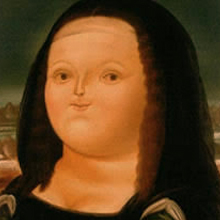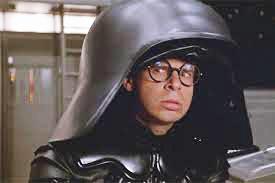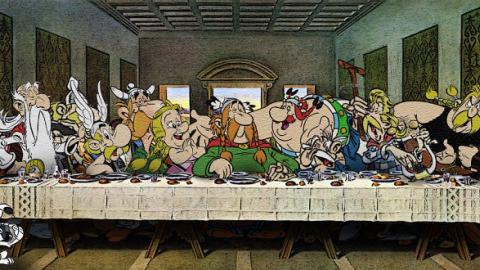
En el New Yorker, Wolcott Gibbs escribió que la parodia es la forma más difícil de escritura creativa porque el estilo del tema debe reproducirse en una forma ligeramente ampliada, manteniendo al mismo tiempo el interés de las personas que no han leído el original. Se plantean más complicaciones ya que debe entretener al mismo tiempo que critica y debe estar escrito en un estilo que no es el propio del escritor. Concluyó que lo único que lo haría más difícil sería escribirlo en cantonés. Evidentemente, es más fácil para la gente disfrutar de una parodia si saben cuál era el original. En nuestra cultura cada vez más diversa, los recuerdos de libros infantiles "clásicos" pueden ser una de las pocas cosas que tenemos en común.
Por eso, los anunciantes, locutores, caricaturistas, periodistas, políticos, blogueros y todos aquellos que quieran comunicarse con un gran número de personas recurren a la variedad de personajes exagerados que recordamos de los libros de la infancia. Chicken Little representaba a los alarmistas; Pinocho representaba a los mentirosos; El Lobo Feroz nos advirtió del peligro; Humpty Dumpty demostró lo fácil que es caer en desgracia; El Príncipe Rana dio esperanza a mujeres de todas las edades; y The Terrible, Horrible, No Good, Very Bad Day de Judith Viorst nos hacen saber que todos tenemos días realmente malos. También discutiremos algunas parodias de Lewis Carroll, Jonathan Swift, Mart Twain, Edgar Alan Poe y Mel Brooks, y "Monty Python".
Edgar Alan Poe escribió un poema titulado “Campanas”:
Escucha los trineos con las campanas.
¡Campanas de plata!
¡Qué mundo de alegría pronostica su melodía!
Cómo tintinean, tintinean, tintinean,
¡En el aire helado de la noche!
Mientras las estrellas que rocían demasiado
Todos los cielos parecen brillar
Con un deleite cristalino.
Manteniendo el tiempo, el tiempo, el tiempo,
En una especie de rima rúnica,
Al tintineo que tan musicalmente brota
De las campanas, campanas, campanas, campanas,
Campanas, campanas, campanas...
Del tintineo y tintineo de las campanas.
Demer Cape escribió una parodia de "Bells". Se trata de "pastillas".
Ver a los doctores con sus pastillas---
Pastillas recubiertas de plata.
¡Qué mundo de miseria infunde su calomelano!
Cómo brillan, brillan, brillan en la noche dorada y helada.
Has cogido dos que se mezclan.
Y desearías haber tenido uno;
Mientras tus mejillas son de un blanco ceniciento...
Oh, las pastillas, pastillas, pastillas...
Pastillas, pastillas, pastillas, pastillas.
Así terminan mis rimas y mis repiques sobre las pastillas.
Barry Pain escribió una parodia diferente de "Bells", se trata de "Tea".
¡Aquí tienes una suave taza de té, té dorado!
¡Qué mundo de pensamientos extasiados me trae su fragancia!
Oh, desde las celdas plateadas
¡Cómo bien!
¡Cómo huele!
Manteniendo la sintonía, la sintonía, la sintonía
Al tintineo de la cuchara
Y la tetera al fuego
hierve su pico con deseo,
…
Pero él siempre volvía a casa a tomar té, té, té,
Té, té, té, té.
Anonymous escribió otra parodia de "Bells". Se trata de "Una flauta".
Escucha el aleteo con su flauta,
¡Flauta de plata!
¡Oh, qué mundo de lamentos despierta su sonido!
Cómo tiembla semi-semi
¡Sobre el aire enloquecido de la noche!
Y desafía todos los esfuerzos
Para escapar del sonido o la vista.
De la flauta, flauta, flauta,
Con su pitido, pitido, pitido...
De la flauta, flyt, fluit, floot, Phlute, Phlewt, Phlewght,
Y el pitido, pitido, pitido de su pitido.
(Este texto fue traducido al Español por Google Translate)



PARODY
By Don L. F. Nilsen
In the New Yorker, Wolcott Gibbs wrote that parody is the hardest form of creative writing because the style of the subject must be reproduced in slightly enlarged form, while at the same time holding the interest of people who haven’t read the original. Further complications are posed since it must entertain at the same time that it criticizes and must be written in a style that is not the writer’s own. He concluded that the only thing that would make it more difficult would be to write it in Cantonese. Obviously, it is easier for people to enjoy a parody if they know what the original was. In our increasingly diverse culture, memories of “classic” children’s books may be one of the few things we have in common.
Advertisers, broadcasters, cartoonists, journalists, politicians, bloggers, and everyone else who wants to communicate with large numbers of people, therefore turn to the array of exaggerated characters that we remember from childhood books. Chicken Little represented alarmists; Pinocchio stood for liars; The Big Bad Wolf warned us of danger; Humpty Dumpty demonstrated how easy it is to fall from grace; The Frog Prince gave hope to women of all ages; and Judith Viorst’s The Terrible, Horrible, No Good, Very Bad Day lets us know that we all have really bad days. We’ll also discuss some parodies of Lewis Carroll, Jonathan Swift, Mart Twain, Edgar Alan Poe, and Mel Brooks, and “Monty Python.”
Edgar Alan Poe wrote a poem entitled “Bells”:
Hear the sledges with the bells—
Silver bells!
What a world of merriment their melody foretells!
How they tinkle, tinkle, tinkle,
In the Icy air of night!
While the stars that oversprinkle
All the heavens, seem to twinkle
With a crystalline delight .
Keeping time, time, time,
In a sort of Runic rhyme,
To the tintinnabulation that so musically wells
From the bells, bells, bells, bells,
Bells, bells, bells—
From the jingling and the tinkling of the bells.
Demer Cape wrote a parody of “Bells.” It’s about “Pills.”
See the doctors with their pills---
Silver-coated pills.
What a world of misery their calomel instills.
How they twingle, twingle, twingle in the icy-golden night.
You have taken two that mingle.
And you wish you’d had a single;
While your cheeks are ashy white…
Oh, the pills, pills, pills—
Pills, pills, pills, pills.
So ends my rhyming and my chiming on the pills.
Barry Pain wrote a different parody of “Bells,” It’s about “Tea.”
Here’s a mellow cup of tea, golden tea!
What a world of rapturous thought its fragrance brings to me!
Oh, from out the silver cells
How it wells!
How it smells!
Keeping tune, tune, tune
To the tintinnabulation of the spoon
And the kettle on the fire
Boils its spout off with desire,
But he always came home to tea, tea, tea,
Tea, tea, tea, tea.
Anonymous wrote still a different parody of “Bells.” It’s about “A Flute.”
Hear the fluter with his flute,
Silver flute!
Oh, what a world of wailing is awakened by its toot!
How it demi-semi quavers
On the maddened air of night!
And defieth all endeavors
To escape the sound or sight
Of the flute, flute, flute,
With its tootle, tootle, toot…
Of the flute, flewt, fluit, floot, Phlute, Phlewt, Phlewght,
And the tootle, tootle, tooting of its toot.
